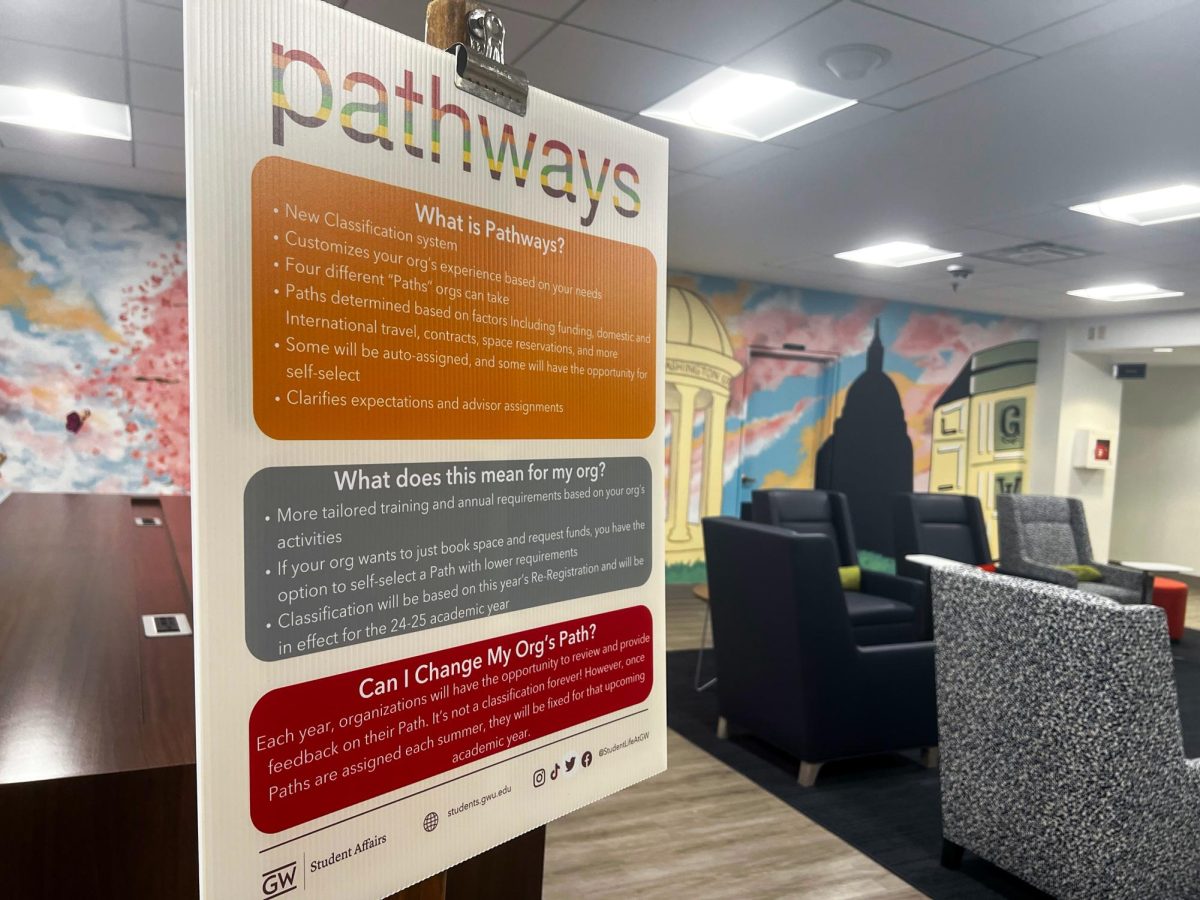Officials will launch an advising system to provide more targeted training and resources for student organizations next academic year.
Pathways, the Office of Student Life’s new advising system, will allow officials to place student organizations in one of four classifications or “paths” — red, blue, orange and silver — which resemble Metro lines, depending on their funding, travel and space needs. Assistant Dean of Student Life Brian Joyce said in an email that the classification system will shape the advising assignments to ensure that Office of Student Life staff are equipped to serve the needs of student organizations.
“In launching ‘Pathways,’ Student Involvement will be able to enhance the student experience by elevating student engagement and advisor involvement,” Joyce said in an email.
Officials announced the program in an email to student organization leaders during the reregistration process in mid-March.
Most student organizations will be classified under the orange path, according to an informational handout, meaning organizations that are “fairly active with typical events throughout the year.” Organizations labeled under the silver path have a lower level of involvement on campus with “minimal” needs and fewer registration requirements.
Student organizations assigned to the blue path will receive specialized adviser support and additional training based on their activities, and those assigned to the red path have a higher level of funding and include an adviser as “part of their job description.”
Organizations will receive their classification for the 2024-25 academic year in mid-July, according to an informational handout. The classification is fixed for the academic year until the reregistration process, but organizations can provide feedback on their assigned color path, the handout states.
Joyce said all student organizations will have access to advisers through Org Help, Excellence in Leadership sessions — required trainings for student leaders of organizations — and online guides. Among those resources, Joyce said the Office of Student Life will assign some student organizations a “specific staff advisor” based on their needs and levels of spending and programming.
“Establishing Pathways will allow the Student Involvement team to provide more targeted training to support the success and wellbeing of our student organizations based on their mission, activities, and logistical needs,” Joyce said.
Senior Tiffany-Chrissy Mbeng, the president of the GWU Pre-Dental Society, said she hopes the new system will help new organization leaders easily find resources, like where to get funding. When she co-founded the Black Girl Pre-Health Collective her first year, Mbeng said she felt “led astray” as she didn’t know where to go for resources like how to obtain funding, and hopes Pathways can help new student leaders and advisers learn about these steps.
“It’s going to be beneficial, especially for new orgs that don’t know how to ask for help or where to reach out,” Mbeng said.
Mbeng said she learned about Pathways in a mid-April email sent from the Office of Student Life that announced the program. She added that she expects the Pre-Dental Society will receive the silver classification, the least intensive assignment given to student organizations with lower activity levels and needs, which would give them the ability to reserve space in University buildings and request funding.
“I knew how to direct this new org I was founding but just based on my experience in the past, I know a lot of students who wanted to found new organizations could suffer a little bit more,” Mbeng said.
Student Government Association President Ethan Fitzgerald said he supports the new system and that it will improve the connection between student organizations and the University. He added that he’s heard positive feedback about the new classification system from his friends in student organizations.
“I believe it helps recognize the needs of our student orgs which are the lifeblood of the GW community,” Fitzgerald said in a message. “Of course we want to ensure the rollout of this new system is as organized and properly communicated as possible. We look forward to further collaboration and enhancing our investment in student orgs.”
Fitzgerald said the SGA’s recent changes to its general allocations process for student organizations, after shifting to an event-based model, won’t affect Pathways since those changes don’t go into effect until the 2025-26 academic year. He added that David Bonilla, the assistant director of student involvement, hosted listening sessions with student organizations to discuss Pathways.





